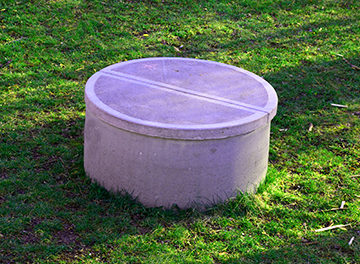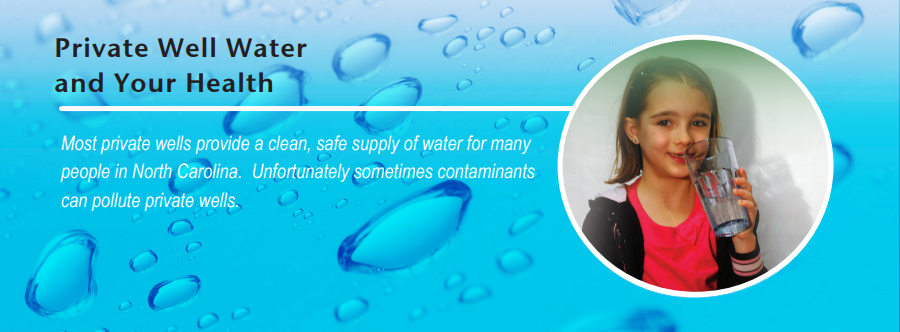Epidemiology: Occupational and Environmental
Private Wells
 Most
private wells provide a
clean, safe supply of water for many people in North Carolina. But sometimes contaminants can
get into your
well water and make you sick. As a private well owner, it is up to you to test your water to ensure it is safe to use.
Most
private wells provide a
clean, safe supply of water for many people in North Carolina. But sometimes contaminants can
get into your
well water and make you sick. As a private well owner, it is up to you to test your water to ensure it is safe to use.
The majority of private drinking water wells in North Carolina are supplied by groundwater. Our groundwater is typically composed of rain and snowmelt that seeps into the ground and flows between the soil, clay, and small cracks in underground rocks before it finally becomes groundwater and enters the well supply. Because contaminants can also follow this pathway and influence the quality of the well water, private well owners must take special precautions to ensure the protection and maintenance of their drinking water supplies.
In December 2020, the NC Private Well and Health Program sent out surveys to residents in North Carolina who had private wells drilled in the past 5 years.
This project was intended to evaluate the impact of the 2008 mandatory testing law (which requires newly constructed wells to be tested within 30 days of being built) on the frequency of well-water interventions of newly constructed wells and the type of interventions implemented by assessing the following overarching questions:
• Are residents receiving their test results?
• Are residents
receiving their Health Risk Evaluations (HREs)?
• What actions are
taken after receiving HREs and/or test results?
• Why actions are
taken after receiving HREs and/or test results?
• What concerns do
residents have about their private well water?
Linked below is the interim report from this project that will inform the development of the next iteration of HRE forms, identify barriers to using recommended treatment systems and address gaps identified in the well water quality intervention processes. This interim report accounts for 1,439 surveys returned to the Private Well and Health Program; the final report will account for all 1,956 returned surveys.
- Learn more about private well water testing in North Carolina .
- Learn more about NC DHHS recommended practices for private well water safety .
- Well Water Treatment Infographic - English/Spanish
- Preparing Your Well for the Next Flood (PDF, 293 KB)
Groundwater contaminants can come from natural sources and processes as well as human and animal sources. Activities which impact the water quality may be close to the drinking water source or many miles away. Groundwater flow is subject to change, which means the distribution and concentration of contaminants in an area may change as well. While the presence of some contaminants can be detected because they change the taste, smell or appearance of the water, others may only be detected by laboratory testing.
Some contaminants, like bacteria and nitrates, can cause short-term illnesses such as gastrointestinal upset, diarrhea, and nausea. Some contaminants may be especially dangerous for certain high-risk populations such as small children, pregnant women, elderly, or individuals with compromised immune systems such as people on chemotherapy or with long-term infection. Contact with high levels of some contaminants in drinking water for many years may increase the risk of long-term (chronic) diseases such as anemia, high blood pressure, and in some cases, cancer. Contact with chemicals that are genotoxic carcinogens will have some degree of risk at any level of exposure.
The degree of risk from contact with contaminants in drinking water depends upon the length of time that you are in contact with the contaminant and the amount of the contaminant to which you are exposed. The effects of exposure to any substance also depend upon how you are exposed, your individual susceptibility to a contaminant, and whether other chemicals are present.

Fact Sheets
- Private Well Water and Your Health - English / Spanish (PDF)
- Arsenic in Well Water - English / Spanish (PDF)
- Barium & Private Wells - English / Spanish (PDF)
- Cadmium & Private Wells - English / Spanish (PDF)
- Chloride & Private Wells - English / Spanish (PDF)
- Chromium & Private Wells - English / Spanish (PDF)
- Copper & Private Wells - English / Spanish (PDF)
- Fluoride & Private Wells - English / Spanish (PDF)
- Iron & Private Wells - English / Spanish (PDF)
- Lead & Private Wells - English / Spanish (PDF)
- Manganese in Well Water - English (PDF)
- Mercury in Well Water - English / Spanish (PDF)
- Nitrate, Nitrite & Private Wells - English / Spanish (PDF)
- pH, Total Alkalinity & Private Wells - English / Spanish (PDF)
- Radionuclides in Well Water - English (PDF)
- Selenium & Private Wells - English / Spanish (PDF)
- Silver & Private Wells - English / Spanish (PDF)
- Sodium & Private Wells - English / Spanish (PDF)
- Sulfate & Private Wells - English / Spanish (PDF)
- Thallium in Well Water - English (PDF)
- Total Coliform Bacteria, E. Coli & Private Wells - English / Spanish (PDF)
- Total Hardness, Calcium, Magnesium & Private Wells - English / Spanish (PDF)
- Uranium in Well Water - English (PDF)
- Vanadium in Well Water - English (PDF)
- Zinc & Private Wells - English / Spanish (PDF)
- U.S. Geological Survey: The Water Cycle: Groundwater Discharge
- U.S. Geological Survey: What is Groundwater?
- View North Carolina maps by contaminant name.
- View contaminant averages for each North Carolina county.
The On-Site Water Protection Branch, which is part of the NC Division of Public Health , Environmental Health Section , is responsible for providing regulatory oversight of sub-surface on-site wastewater treatment and dispersal systems, as well as inspection and testing of private drinking water wells constructed, repaired or abandoned, on or after July 1, 2008.
Questions regarding well permits and construction can be answered at https://ehs.ncpublichealth.com/oswp/.
Private Wells Pages
Related OEEB Programs
- Chemical Preparedness and Response Surveillance (ChPRS) Program
- Health Assessment, Consultation and Education Program
- Medical Evaluation and Risk Assessment Program
Additional Resources
Last Modified: February 28, 2024
